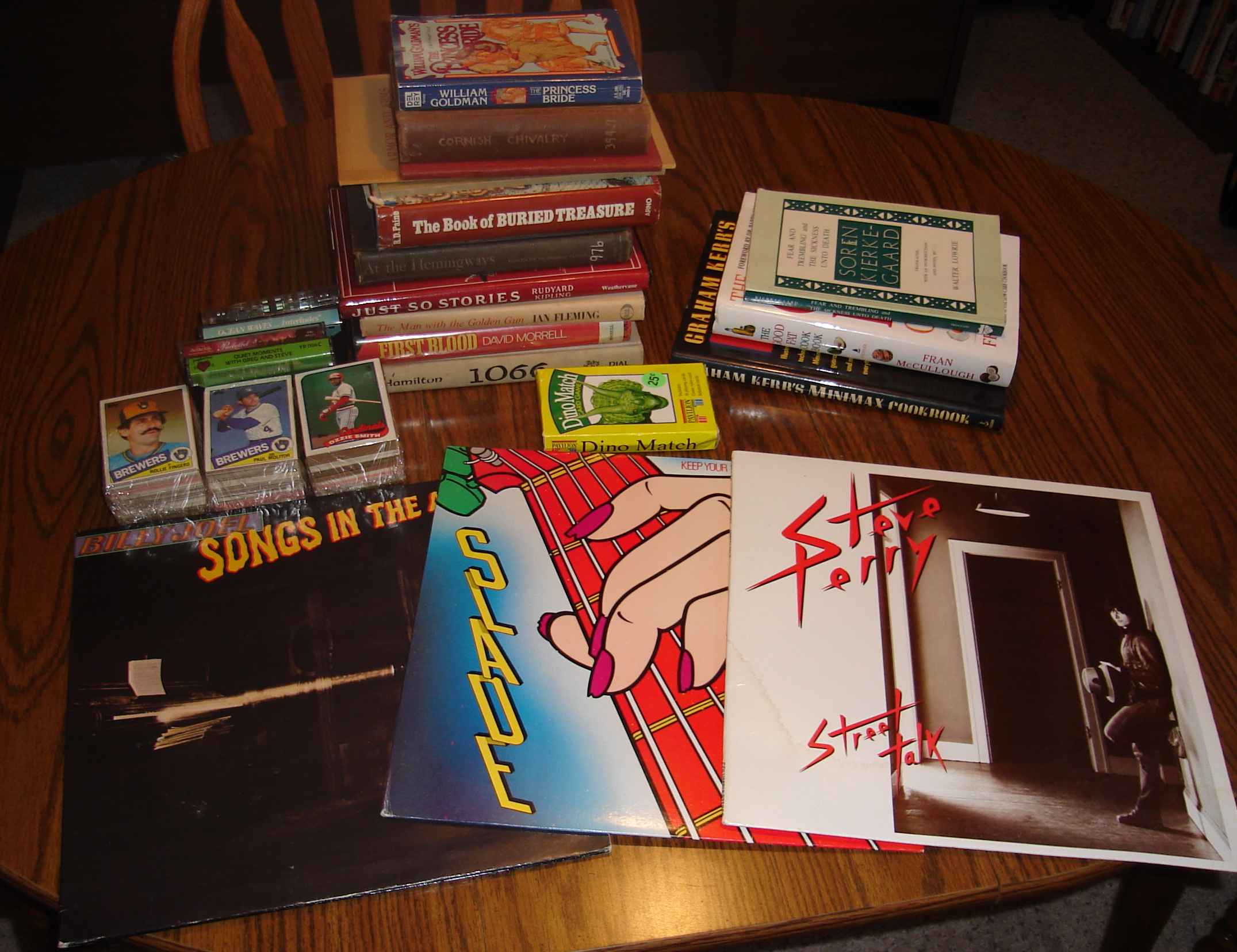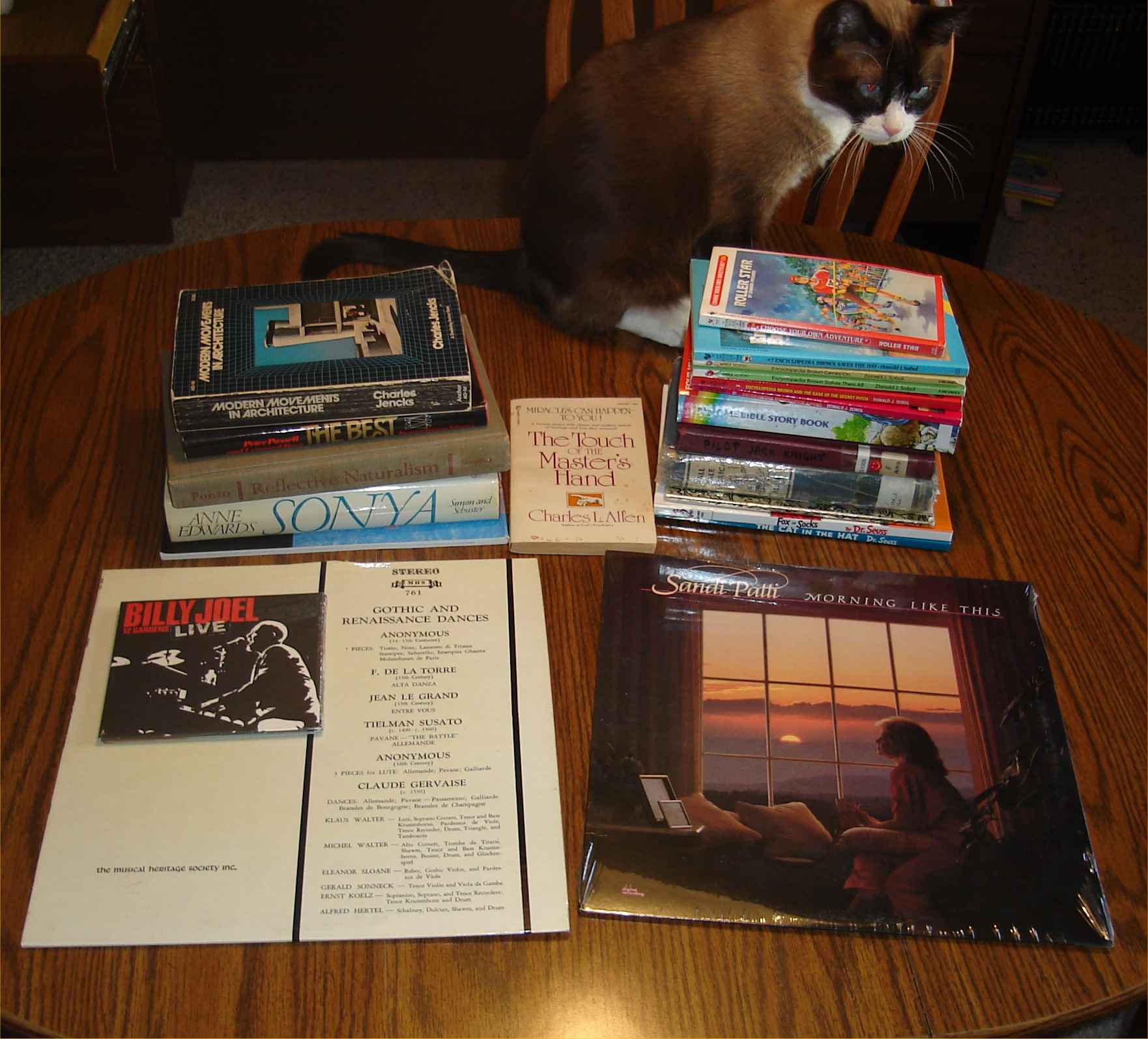Ah, finally, that time again, my friends. The birds are singing, the sun is shining, the snows that came on Friday have receded by Monday, and it’s book sale season again! Well, not quite full on book sale season, but Heather found something in the city claiming to be a sale of 1000 books, so off we went.
The sale was in a nice section of the city, St. Louis Hills or thereabouts, and it did indeed feature a number of books. A lot of books. Dollar hardcovers and old hardcovers at that. I never did ask the source of the books–the sale was in a single family home–but I did partake. I would have partooken of more were I building a reference library, gentle readers, but recent bookshelf acquisitions have shown me how space-consuming a reference library really is. So I only bought a couple of books (noted below, of course). The sale also offered old bottles at $3.00, collector sorts of bottles from various liquors around the world. Which leads to the funniest thing I saw today (so far): a rather South City Hoosierish looking fellow followed me in the pay money line, and he carried an esoteric and exotic bottle. Full. He spoke with the woman and they agreed that the vodka would still be good. Also, he had a Shooter’s Handbook gun reference guide that he wanted, but he didn’t want to pay a dollar for it; fifty cents, he offered, even though large reference books were $2.00. The woman offered it to him for the buck, but he wouldn’t pay more than fifty cents for it. I can guess why not; that fifty cents was a whole sixth of a bottle of ancient vodka.
We also made a couple of other stops: one, a garage sale in the tiny municipality of Grantwood Village that had record albums for $3.00. I asked her if she’d take a dollar, and she would. Jeez, you record and cassette sellers, you need to know your price point here. Individual songs are a buck on the Internet. If someone wants to buy your old record or cassette, that person probably wants one song for sure and perhaps the rest as “maybe I’ll like it, too.” So you need to beat that dollar price point. You cannot hope that the stuff you liked back in the day along with millions of other teenagers in your generation will somehow prove to be a “collector’s item.” Keep it under a buck, or you’ll keep it, period.
Our third stop was the local rec center for the community garage sale. People, and not a lot of them, ponied up $18 for a table. Given the selection scattered across the dozen tables, either the rush came right when it opened and cleaned it out, or people were foolish to expect to sell that stuff and make $18 back. Never the less, I bought some baseball cards and cassettes.
Here’s our first noted score for the year:

Click for full size
Here’s what I got:
- The Civilization of The Renaissance in Italy by Jacob Burckhardt. Not pictured because it was floating around the back of the truck until after the photo was taken.
- The Princess Bride by William Goldman. I realized when I told Heather about the book that I’d borrowed it from a friend to read. Now, I have it, so she can read it. Which is good, since the friend went from my best man to not talking to me in about 1 year. Which, oddly enough, is longer than it took the fellow who was supposed to be my best man.
- Chivalry by a fellow named Cornish. Not actually a book about Cornish Chivalry.
- The Danger of Peace by J.W. Allen. A lecture given at King’s College in London in 1915, so I think it will have an interesting perspective.
- Armor and Arms, a catalog of arms in the City Art Museum of St. Louis in 1954.
- Armor in the Victoria and Albert Museum (London) in 1951.
- The Book of Buried Treasure, a nonfiction book about buried treasure.
- At The Hemingways, a nonfiction account of life with Ernest Hemingway and family by someone with Hemingway in the name.
- Just So Stories by Rudyard Kipling.
- The Man with the Golden Gun by Ian Fleming because I haven’t read a Bond book in a while. Of course, I already had a couple to read, but now I have this one, too.
- First Blood by David Morrell. I bought Rambo: First Blood Part II in August last year, but I should read this book first. Side note: of the 23 books I bought on August 27, 2007, I have already read 5. Yay, me.
- 1066, a book about the Norman Conquest. Because one cannot have enough about that pivotal moment in history in one’s house.
Additionally, I bought the following musical stylings:
- Four audio cassettes with names like Quiet Moments and Ocean Waves: Interludes. BECAUSE I NEED THE SOOTHING!
- Street Talk by Steve Perry on vinyl. “Oh, Sherrie” plus.
- Songs in the Attic by Billy Joel on vinyl. Sure, I already have it on cassette. But I am a collector! Come to think of it, I might already have this on vinyl. If so, it’s still good. BECAUSE I NEED THE COLLECTING!
- Keep Your Hands Off My Power Supply by Slade. “Run Runaway” plus. Man, I cannot wait to blare that one.
Also, I bought a stack of baseball cards, three packs for like a quarter each. How could I not, with Rollie Fingers, Paul Molitor, and Ozzie Smith looking out at me?
Also, we got a game for the boys, and my wife bought a couple of cookbooks.
A couple weeks ago, I bought a couple new five shelf bookcases to spread out my to read stack. This means that on two bookcases, my books are not double-stacked. This spring and summer will alleviate that, no doubt.
Total purchased:12 books, 3 records, 4 cassettes.
Total spent:$20.90




